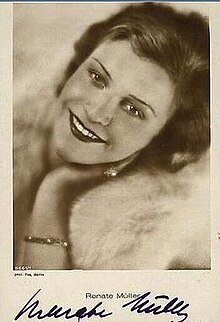Renate Müller
| Renate Müller | |
|---|---|

photographed in 1935
|
|
| Born |
26 April 1906 Munich, Germany |
| Died | 7 October 1937 (aged 31) Berlin, Germany |
| Other names | Renate Muller |
| Occupation | Actress |
| Years active | 1929–1937 |
Renate Müller (26 April 1906 – 7 October 1937) was a German singer and actress in both silent films and sound films, as well as on stage.
One of the most successful actresses in German films from the early 1930s, she was courted by the Nazi Party to appear in films that promoted their ideals, but refused. Her sudden death at the age of 31 was initially attributed to epilepsy, but after the end of World War II, witnesses suggested that she had been murdered by Gestapo officers, although another theory contends that she committed suicide. The true circumstances of her death remain unknown.
Born in Munich, Germany, Müller entered films in the late 1920s in Berlin and quickly became popular. A blue-eyed blonde, she was considered to be one of the great beauties of her day and along with Marlene Dietrich was seen to embody fashionable Berlin society. She starred in more than twenty German films, including Viktor und Viktoria (1933), one of her biggest successes, which was remade decades later as Victor Victoria with Julie Andrews. After making Sunshine Susie (1932) in England, she returned to Germany and was delayed by anti-German French officials for a short time in Paris. The incident was used by Dennis Wheatley as a basis for his short story, "Espionage". The story and a short discussion of the incident are included in Wheatley's short story collection Mediterranean Nights.
With the rise of the Nazi Party, Müller came to be regarded as an ideal Aryan woman and particularly in light of Dietrich's move to Hollywood, was courted and promoted as Germany's leading film actress. A meeting with Adolf Hitler in the mid 1930s resulted in Müller being offered parts in films that promoted Nazi ideals.
...
Wikipedia
